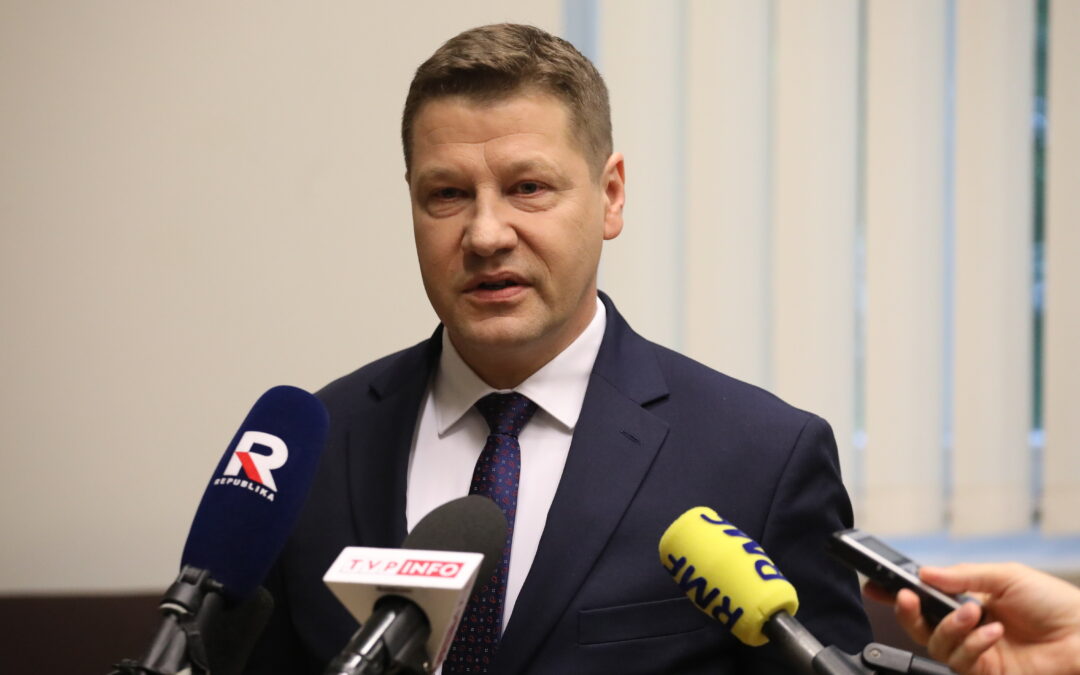Three judges are seeking criminal charges against the president of their court – a key figure in the government’s overhaul of the judiciary – for refusing to implement a European court order to reinstate them to their previous positions.
Marzanna Piekarska-Drążek, Ewa Gregajtys and Ewa Leszczyńska-Furtak – who serve on Warsaw’s court of appeal – filed a notification to prosecutors last week accusing Piotr Schab, the court’s president, and Przemysław Radzik, his deputy, of abuse of power, a crime carrying up to three years in prison.
The case is the first time judges have sought charges against an official for failing to comply with a European Court of Human Rights (ECHR) ruling, notes news service OKO.press.
Jest zawiadomienie do prokuratury dotyczące Schaba i Radzika. Za niewykonanie zabezpieczenia ETPCz @M_Jaloszewski https://t.co/1ZpxRwCa3T pic.twitter.com/4ihV2Zn6GA
— OKO.press (@oko_press) January 16, 2023
The three judges were transferred by Schab from the criminal department of Warsaw’s court of appeal to the labour and social security department.
The decision was made after they refused to sit alongside judges chosen by the National Judicial Council (KRS) – the body responsible for nominating judges – after it was overhauled by the government to give politicians greater control over the body.
Various rulings by Polish and European courts have found the new KRS to be illegitimate and legal experts say that rulings issued by judges nominated by it may be legally defective
Schab – who is also the top disciplinary officer for judges – accused the trio of “a longstanding refusal to perform fundamental official duties”. However, they took their case to the ECHR, which last month ordered their transfer to be provisionally suspended until the Strasbourg court makes a final ruling.
Schab, however, has refused to implement the ECHR order, saying it is not binding.
He referred to a 2021 ruling by Poland’s constitutional court – a body is widely seen as being under the influence of the ruling party and which the ECHR itself has found is not a “tribunal established by law”- stating that the ECHR cannot question the status of Polish judges.
Schab also argued that the ECHR’s ruling was issued on a procedural basis that was not part of the European Convention on Human Rights, and therefore was not binding on his court, reports OKO.press.
Finally, he noted that he himself was not a party to the proceedings before the ECHR and that its “judgements are only binding n the parties” involved.
“I find that there are no factual and legal grounds for implementing this recommendation [by the ECHR],” wrote Schab last month. “The ECHR cannot assess…the status of judges.”
However, 45 judges on his court disagree, and yesterday jointly published an appeal for their three colleagues, Gregajtys, Piekarska-Drążek and Leszczyńska-Furtak, to be reinstated.
Schab’s “position violates Poland’s obligations under the European Convention on Human Rights and also undermines the authority of our court”, they wrote.
„My, sędziowie orzekający w Sądzie Apelacyjnym w Warszawie, wyrażamy stanowczy sprzeciw wobec stanowiska Prezesa Sądu Apelacyjnego w Warszawie Piotra Schaba, odmawiającego wykonania środka zabezpieczającego wydanego przez Europejski Trybunał Praw Człowieka”https://t.co/GRpDj9x6Aq pic.twitter.com/0mTJwzb5wF
— IUSTITIA Stowarzyszenie Sędziów Polskich (@JudgesSsp) January 17, 2023
Schab is seen as a key figure in the judicial overhaul led by justice minister Zbigniew Ziobro over the past seven years. Ziobro also serves as public prosecutor general, putting him in overall charge of Poland’s prosecutorial service.
The latest dispute within Schab’s court is a further example of how Poland’s rule-of-law crisis has not just pitted Polish institutions against European ones, but has also caused divisions within Poland’s own judicial community between those who have generally supported the government’s policies and those who have opposed them.
Main image credit: Maciek Jazwiecki / Agencja Wyborcza.pl

Alicja Ptak is deputy editor-in-chief of Notes from Poland and a multimedia journalist. She has written for Clean Energy Wire and The Times, and she hosts her own podcast, The Warsaw Wire, on Poland’s economy and energy sector. She previously worked for Reuters.




















